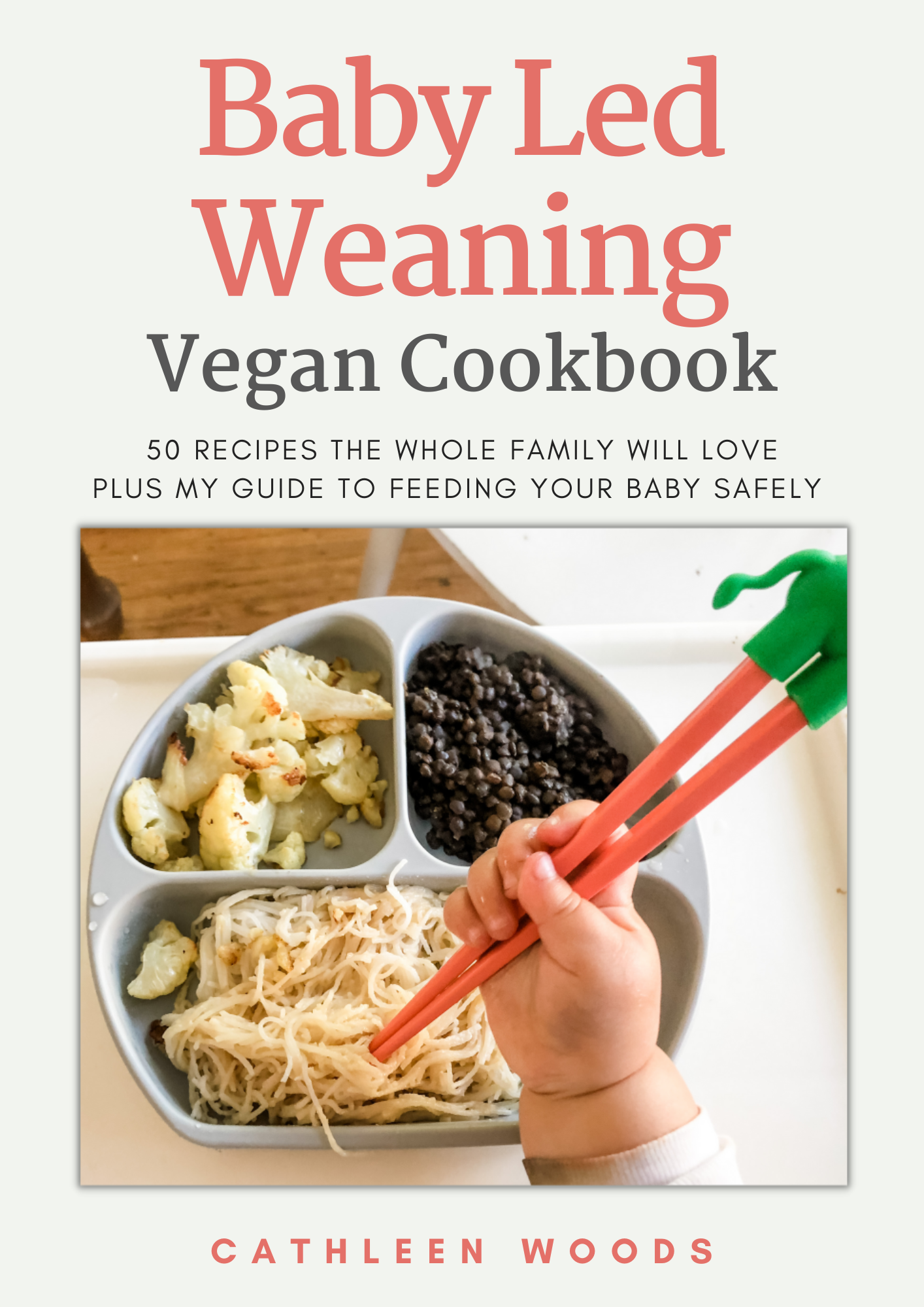FTC Disclosure: If you make a purchase via a link on this site, I may receive a small commission on the transaction - at no added cost to you - this is my side job to being a mom and it helps to support our family, so I greatly appreciate it!
Getting Enough Vegan Calcium
During Pregnancy is Easy
Many women worry about getting enough calcium during pregnancy, and they're smart to be concerned. Luckily, if you're following a healthy vegan diet, you should have no trouble finding plenty of calcium rich foods.
I noticed that when I got to the third trimester, my baby seemed to be begging me for more calcium, and her way of showing it was to give me Charlie horses in the middle of the night. The days I forgot to take in enough calcium, I'd be graced with a pull in my calf at 3am.
Concern about calcium nutrition during pregnancy is justified because if you don't eat enough foods with calcium, your body will simply take the calcium from your bones, making them more susceptible to breakage and leads to osteoporosis.
What's not justified is the bad reputation vegan diets have for lacking calcium rich food options.

Milk Does NOT Do A Body Good
There's a common misconception that cow's milk is a healthy and abundant source of calcium during pregnancy. What we need to remember is that just because we see commercials telling us something does not mean it is true. The "Milk Does a Body Good" commercials are paid for by The Milk Processor Education Program and Dairy Management Inc.
Just think about that... are you going to believe something just because a company with a lot of money buys a lot of ads to make us believe it?
You may be thinking, "Well, my doctor said to drink milk." Unfortunately, most doctors spend very little time in medical school studying nutrition. That is totally backwards since what we put in our bodies plays a huge role in how our bodies function, but that's the situation.
The truth is that while cow's milk does have a lot of calcium in it, the human body does not easily absorb that calcium. In fact, animal proteins like casein create an acidic environment in your body, which creates waste that binds with calcium. Your body protects itself by pulling out that waste along with the calcium. Hence, eating animal protein will actually leech calcium from your body and throw it into the toilet.
Additionally, most humans do not have the ability to digest lactose; some even develop complete lactose intolerance (estimated at about 20% of Caucasians, 70% of African Americans and American Indians, and 50% of Hispanic-Americans). The reason for this is because animals are raised on their own mother’s milk until they are weaned and able to eat that particular animal's standard diet. Humans are the only species of animal that drinks milk from another animal's mother, and the only species that drinks it well past weaning.
Instead of simply avoiding milk products after finding out they're lactose intolerant, most humans will just start taking lactase, an enzyme which helps our bodies to absorb lactose. Lactaid milks are simply regular milks with lactase added in. Why are we doing this to ourselves? If your body cannot absorb it, why are you still trying to find a way to force it down your throat? Listen to your body.
Some might wonder why we chose cows as the recipient of our "best source of calcium" award. Why not raccoons or skunks? Or elephants? Many speculate the reason for this is because cows were easy to tame and keep locked in crates, and they are big enough that their bodies produce a lot of milk.
Because humans were already eating the meat from cows, they found a way to exploit every part of the cow, including its milk. The ad campaign started, professing that milk was a great source of campaign, the hospitals and medical schools were given literature about how much calcium was in the milk, and bam, what do you know? Fifty years later people think milk is the only way to get calcium.
A lot of non-vegan women have trouble getting enough calcium during pregnancy especially because often they are troubled with morning sickness while eating foods like milk, yogurts, cheeses, and meats, so they stop eating them. Above all, we must learn to listen to our bodies. If you body is making an obvious case for hating something, there must be a good reason.
So, even though cow’s milk is not good for you, is it still true that humans need a lot of calcium during pregnancy? Yes.
Your Baby Needs You to
Eat Calcium Rich Foods
Calcium is vital for creating strong bones and teeth, and it also helps the heart, muscles, nerves, and blood to perform properly. When you are lacking in calcium, the opposite happens and you may develop brittle bones and nails, heart palpitations, twitching, nerve sensitivity, insomnia, and numbness.
If you don't eat enough calcium during pregnancy, your baby will simply take the calcium s/he needs from your bones, which puts you at an increased risk for osteoporosis. Also, you put yourself at a higher risk for pre-eclampsia and pregnancy-induced hypertension, which affect up to one in seven American women during pregnancy and often lead to increased risk for cesarean sections, low birth-weight babies, and pro-term births.
If you're eating a wide variety of fruits, vegetables, whole grains, and beans, and you exercise, you are unlikely to be at risk for a deficiency. You can develop a calcium deficiency if you do not eat enough calcium and if you do eat a lot of phosphorous, such as in sodas, meat, eggs, and cheese. It's best to maintain a ratio of 1:1 phosphorus: calcium in order to avoid a deficiency, whereas most Americans have a ratio of 4:1 because of their heavy consumption of animal products and proteins.
The U.S. Recommended Daily Allowance for calcium during pregnancy is 1200mg when you are pregnant or breastfeeding. You do not want to exceed 2500mg of calcium each day. Although it usually won't lead to health problems, getting too much calcium can affect people with thyroid issues.
Great Sources of Vegan Calcium
During Pregnancy:
- Broccoli
- Greens (Collard, Kale, Chard, Mustard Greens, Bok Choy)
- Spinach
- Soybeans
- Tofu
- Nuts (Almonds)
- Dried figs
- Apricots
- Blackstrap Molasses
- Calcium enriched fruit juices
- Oranges
- Okra
- Kelp
- Brazil Nuts
- Sesame seeds (or tahini)
As a quick example, one cup of cooked black-eyed peas has more calcium than one ounce of cheese, and your body can actually absorb all of that calcium easily, unlike that of the cheese.
An easy way to get plenty of calcium is to toss together a juice with as many of these high-impact fruits, vegetables, and nuts. I also made sure to drink orange juice fortified with calcium and vitamin D, just to cover my bases.
Do I need a calcium supplement?

If you are eating the food sources of calcium listed above, you should not need a calcium supplement. However, once you hit the third trimester, your chance of getting Charlie horses increases, and that's the best time to start loading up on extra calcium pills.
Make sure to take ones that have magnesium, which helps the body to absorb the calcium.
Another note is that if you are experiencing severe nausea and are unable to consume healthy foods, check to see if your prenatal vitamin is supplying enough calcium. In many cases, you will find that it doesn't provide enough calcium during pregnancy.
When looking for a calcium supplement, make sure it is calcium citrate instead of calcium lactate or calcium carbonate. Both of the former calcium supplements make your body more alkaline and slow down absorption. Also, of course, look for vegan calcium sources. Many supplements contain ground cow bones (bone meal) and oyster shell, which is pretty gross.
Sources:
http://my.clevelandclinic.org/healthy_living/pregnancy/hic_increasing _calcium_in_your_diet_during_pregnancy.aspx
http://www.pregnancy.org/question/can-i-get-too-much-calcium-during-pregnancy
http://babyfit.sparkpeople.com/articles.asp?id=800
http://www.kidsource.com/kidsource/content/news/calcium.4.9.html







New! Comments
Have your say about what you just read! Leave me a comment in the box below.